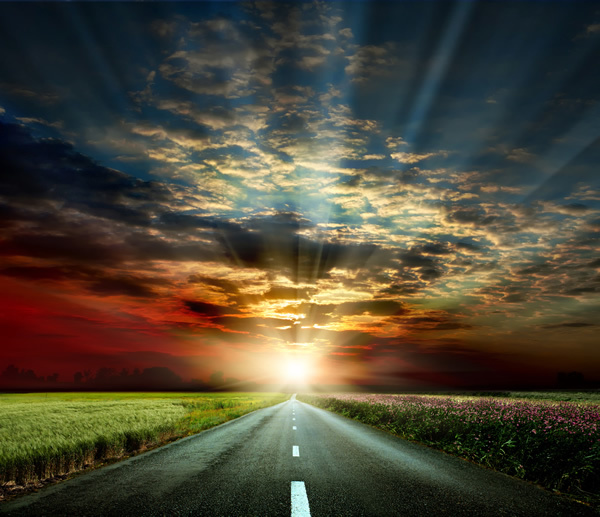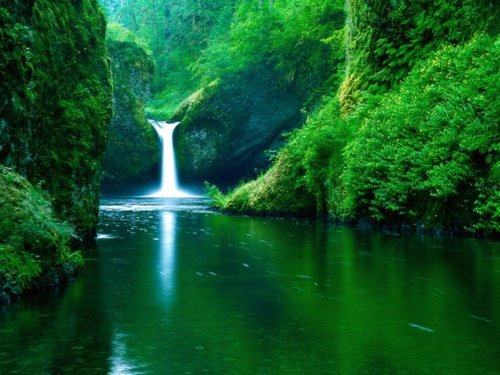How can a single, beautifully written sentence affect one’s entire being? Early this morning, as the sun rose, a line from Hamlet stopped me in my tracks. The beauty of that one simple but exquisitely eloquent sentence has remained with me all day: “But look, the morn, in russet mantle clad.”
 I have depended on external beauty to induce meditation. That has seemed natural to me, but now I question it. It’s no longer good enough.
I have depended on external beauty to induce meditation. That has seemed natural to me, but now I question it. It’s no longer good enough.
Not because I want ‘more,’ but because I no longer want to depend on outer beauty to induce an inner awareness of beauty; on stillness in nature to induce stillness of mind; on cosmic timelessness to induce living beyond the prison of time.
So why is external beauty still necessary to see and feel the essence of beauty, and for memory/time to end within one?
The movement of memory, the movement of thought, and the movement of time are essentially the same thing. Beauty, renewal, growth and love do not arise and cannot grow from that soil.
Consciousness as we usually know it is fragmentary, and so we are broken up, incomplete. We take that as a given, but it is not. There is another order of consciousness available to us.
The culture, world and consciousness as we know it have become so dark and toxic that a working understanding of these things is necessary simply to inwardly survive. Of course many people have taken the easier way, and go along to get along, at the price of becoming inwardly dead.
Completeness of being comes with the ending of time. Yet apparently few people ever consciously know a surcease of time. Is it conveyable? If the beauty of the early morning can be conveyed in a single line, perhaps an intimation of the ending of time can be conveyed between the lines.
Even so, one can read Shakespeare every day, and be surrounded by great art, or for that matter live in Tibet and see the Himalayas every day; but if beauty is not flowering within one, the dilemma of duality persists.
We usually only feel beauty in the forms it takes, especially in nature. But in actuality, beauty is neither outward nor inward but both, indivisible.
I’m not speaking of Platonic ideals, but seeing and feeling the essence of beauty, which is inseparable from nature, and at the same time beyond the endlessly creative forms of nature.
There are two unbridgeable states of being—the chattering, self-concerned, problem-ridden mind, and a silent, complete and timeless quality of being.
Why the back and forth between them? Can one, can anyone, free themselves totally from thought-consciousness?
The brain cannot exist in two states at the same time—the state of thought/self/time, and the state of stillness/beauty/timelessness. The former has to cease for the latter to be.
For me these aren’t abstract ideas, but as real as the grass beneath my bare feet. It’s clear one cannot awaken the state of complete stillness and ending of time, and the sacredness that comes with it, by having any idea whatsoever about it.
The idea gives rise to a goal; the goal generates effort; and the effort produces a conflict between what is and what one is striving for.
Then how are we to reach the other shore? For me that isn’t the problem, but I sympathize with those who feel flummoxed by it.
To my mind, the contemplative life is a matter of taking the time (a paradox I know) to observe all ideas and conceptions as a single movement of thought. Watching the movement in its entirety, without interference as choice, judgment or direction, the mind as thought naturally, effortlessly and spontaneously falls silent.
The dilemma for me is in the seeming duality between two completely different orders of consciousness—the known, as thought, that’s generating more and more disorder; and the unknown and unknowable that reverberates with the ever-changing, ever-changeless order of the universe.
Lately I feel like a ferryman for myself, bringing not people but portions of human consciousness within myself across the river that separates the human being from a timeless state of being which is the actual nature of things.
If we are not individuals as we usually conceive it (atomistic units of distinct and autonomous agency), but inseparably linked to culture and consciousness, there may be some merit to this work.
But I tire of it, and in the end, one has to dwell in the timeless realm, or the world of time envelops you. I don’t know what it would mean not to revert and return, but can it happen, now?
Martin LeFevre

